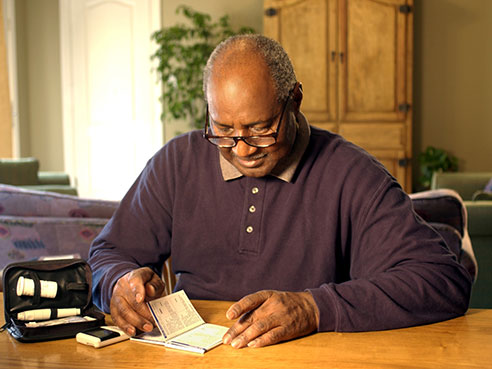 University of Alabama at Birmingham School of Nursing Assistant Professor Loretta T. Lee, Ph.D., has received a 2015 Deep South Resource Center for Minority Aging pilot grant award to examine the association of social support and intuitive eating with glycemic control in older African-American men with diagnosed type 2 diabetes.
University of Alabama at Birmingham School of Nursing Assistant Professor Loretta T. Lee, Ph.D., has received a 2015 Deep South Resource Center for Minority Aging pilot grant award to examine the association of social support and intuitive eating with glycemic control in older African-American men with diagnosed type 2 diabetes.
For her study, Lee defines intuitive eating as a learned behavior that helps a person focus on physiological body signals for eating, improving self-image and coping with emotions. Intuitive eating also reduces the focus on cues for eating, such as societal messages and dieting. Glycemic control is the daily management of blood sugar levels, striving for a level as close to normal as possible for a person with diabetes mellitus.
Recent work by Lee’s research team has found that many African-American men with diabetes have unhealthy eating practices. They also know that less than 50 percent of African-American men live with a spouse or partner.
Since glycemic control is thought to be determined largely by self-management that includes consuming a healthy diet, Lee and her team want to see whether social support can contribute to a healthier diet and thus to improved intuitive eating practices and better glycemic control.
“We hypothesize that social support, particularly the presence of a spouse or partner, will increase the likelihood that older African-American men with diabetes will adhere to intuitive eating practices,” Lee said. “Our second hypothesis is that intuitive eating practices will be associated with lower hemoglobin A1c, a measure of glycemic control, among these older men with diabetes.”
| “Type 2 diabetes mellitus is the leading epidemic of the 21st century, affecting millions of people in the United States. Older African-American men are disproportionately affected with diabetes compared to Caucasians. |
The hemoglobin A1c, or glycosylated hemoglobin, is a test that reflects a person’s average plasma glucose concentration over prolonged periods (usually two to three months). In this study, members of Lee’s focus group, older African-American men with type 2 diabetes who receive care at Cooper Green Mercy Hospital in Birmingham, will be characterized by good control (a hemoglobin A1c level of less than 7 percent), moderate control (a level of 7 to 9.5 percent) and poor control (a level greater than 9.5 percent).
Lee believes this study could help improve the quality of life, not only for older African-American men, but for many others who suffer from type 2 diabetes mellitus as well.
“Type 2 diabetes mellitus is the leading epidemic of the 21st century, affecting millions of people in the United States,” Lee said. “Older African-American men are disproportionately affected with diabetes compared to Caucasians, with more men compared to women across all races in the United States being affected.
“Intuitive eating practices, i.e., healthy approaches to eating that include awareness of the physical and emotional sensations experienced while eating or in a food environment, have been shown to help people with chronic diseases. We expect to prove that social support plays a key role in achieving and maintaining those positive intuitive eating practices.”
The RCMAR pilot grant award is given to an early-career scientist who is focusing on minority aging and health disparities in the African-American population. Lee’s grant is a $10,000 award for one year.